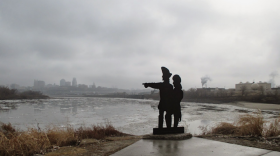More than a couple of centuries have passed, so I can't imagine that some guy with a baseball bat is going to come by and break my leg.
So let me just call it the way I see it. Chief Blackbird--yes, I know there's a fine casino named after him, as well as a bend in the river--the man ruled--I mean ruled--Omaha country, a chunk of Missouri River land that stretched from Yankton to Belleview and more, both sides of Big Muddy.
That's no small pickings. Took some doing, I'm sure, to rule the roost. It was, I'd guess, an entire kingdom, not to mention the fact that just before 1800 there were a couple thousand Omaha people. That's the world the man ruled. Big it was and rule he did.
He'd established his powerful reputation in war by way of frequent battles against every other band along the river--Pawnees, Ponca, Otoes, Kanzas. When he was a boy, he was captured by the Sioux--and somehow escaped. Seriously.
Chief Blackbird never lost any sleep on account of the encroaching white man. When the French or the Spanish came up or down the river, he figured the only way to deal with them was to beat ‘em at their own game. There was, back then, money to be made and goods to be won in beaver pelts and buffalo hides. Okay, he might have said, let's cut us some deals.
Along the way, he picked up some nastiness. Blackbird, like any other mafia don, liked nice things and wasn't afraid of flaunting what he had. He was a wheeler-dealer, and when his starving people started smelling graft, they weren't about to take it--big chief or no big chief.
His white traders winked and told him to take care of business, then handed over a medicine bag of arsenic. "This stuff'll handle your issues," those white men told him, snarling out a smile, I'm sure.
Blackbird knew he was in over his head. To hold on to what he had, he figured it might be helpful to register some mysterious power. So he did. He used that arsenic like a silencer, told people who'd opposed him that soon enough they'd get their due, swore to it. Shockingly, those men keeled over. Wasn't a magic show, just arsenic. Suddenly, Blackbird had big medicine; his power only grew.
And so it went until he met an enemy that arsenic or gunfire wasn't going to best. The Omaha, like every other Missouri tribe, had no defense against an plague that crept in without a sound and carried no rifles. In silence, the enemy came in like a barely discernable mist, crept up over the land in and left the Omaha people dead or dying.
Six days or so after the fever began, people died of systemic shock--the entire body shut down. Often, those able to live through it were left blind, horribly scarred. Mercy killing was not uncommon. Warriors went into battle simply because they preferred to die with dignity.
Blackbird came down with the disease--who knows how? He had no magic to fight it.
He was buried up high above the river, at a spot where today a memorial in his honor sits along Highway 75. His lifeless body was strapped to his horse, just the way he wanted to be, eyes over the river below, watching for traders coming up the Missouri.
Four years later, Lewis and Clark pulled ashore and climbed the hill to pay respects. Blackbird's mound must have been hard to miss.
In death, of course, he was not alone. Researchers estimate that as many as 1500 Omaha died. He fell to a curse not even the godfather could escape.
It's comforting to know that the much-anticipated first meeting was no big deal. Lots of smiles, lots of signing. All went well, really. Eventually, they'd have their moments, but their first meeting rolled right along like the river beside them, just rolled along, the whole bunch eating watermelon.









